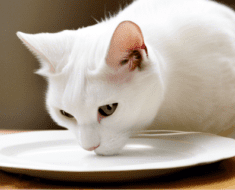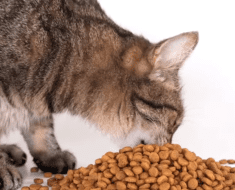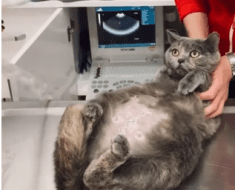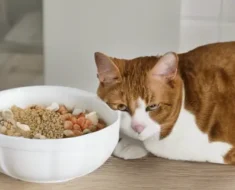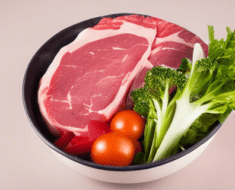You can feed your kitten cat food around the age of 4 to 6 weeks. As your kitten grows, their nutritional needs change, and it becomes essential to provide them with a well-balanced diet.
One crucial aspect of their diet is transitioning them from formula or mother’s milk to solid food. The ideal time to introduce cat food to their diet is when they are around 4 to 6 weeks old. At this stage, kittens start to develop their teeth and can chew solid food.
However, it is important to choose a high-quality kitten food that provides all the necessary nutrients for their growth and development. Feeding appropriate cat food to your kitten helps ensure they get the proper nutrition and support their overall health and well-being.
Importance Of Proper Nutrition
Feeding your kitten cat food at the right time is crucial for their proper growth and development. It is important to ensure that your kitten receives the necessary nutrients from a balanced diet to support their overall health and well-being.
Consult a veterinarian for guidance on the appropriate time to transition to cat food.
Kittens require a diet that meets their specific nutritional needs for healthy growth and development. Providing your kitten with the right balance of nutrients is essential for their overall well-being and to set the stage for a long and healthy life. Proper nutrition is crucial as it ensures that your kitten receives the necessary energy, vitamins, minerals, and other essential components to support their growth and maintain optimal health.
Essential Nutrients For Kittens
Kittens need a diet that is rich in essential nutrients to support their rapid growth and development. These nutrients include:
- Protein: Protein is essential for muscle and tissue development in kittens. High-quality animal-based protein sources such as chicken, turkey, and fish are recommended for optimal growth.
- Fat: Healthy fats provide energy and help kittens absorb fat-soluble vitamins. Omega-3 fatty acids, found in fish oil, are especially beneficial for brain development.
- Carbohydrates: Carbohydrates serve as a source of energy for active kittens. Whole grains and vegetables are excellent sources of carbohydrates.
- Calcium: Calcium is important for proper bone growth and development in kittens. It is necessary for the formation of healthy teeth and bones.
- Vitamins and Minerals: Kittens require a variety of vitamins and minerals, including vitamin A, vitamin D, iron, and zinc, among others.
Impact Of Diet On Kitten’s Growth
The diet you provide for your kitten plays a crucial role in their growth and development. A well-balanced diet that fulfills their nutritional requirements will contribute to:
- Healthy bone and teeth development
- Strong muscles and overall muscular development
- Proper organ function
- A strong immune system
- Optimal brain development and cognitive function
- Healthy skin and a shiny coat
Transitioning From Kitten To Cat Food
Transitioning a kitten from its regular diet to cat food is an important process that should be done gradually to ensure the health and well-being of your little furry friend. As your kitten grows, their nutritional needs change, and they require a more balanced diet. Introducing them to cat food when they reach certain age milestones is crucial for their development. In this article, we will explore the age milestones for transitioning and the gradual diet change process.
Age Milestones For Transition
Transitioning your kitten to cat food should occur at specific age milestones:
- 4-5 weeks: Kittens start developing teeth and can be introduced to moistened cat food.
- 5-7 weeks: At this stage, kittens can be gradually weaned off their mother’s milk, and their diet can consist of moistened kitten food.
- 7-10 weeks: Kittens can now consume cat food that has been softened with water or kitten formula.
- 10-12 weeks: By this age, kittens should be fully weaned off of their mother’s milk and be able to eat dry or wet cat food without any assistance.
Gradual Diet Change Process
Transitioning your kitten to cat food should be done gradually to avoid digestive issues. Follow these steps for a smooth diet change:
- Start by mixing a small amount of cat food with their regular kitten food.
- Gradually increase the proportion of cat food over several days.
- Monitor your kitten’s behavior and well-being during this transition period.
- If any digestive issues arise, slow down the process and consult your veterinarian if needed.
- Once your kitten is comfortable with the new cat food, you can complete the transition and begin feeding them cat food exclusively.
By following these age milestones and the gradual diet change process, you can ensure a smooth transition from kitten to cat food, providing your growing feline companion with the necessary nutrients for a healthy and happy life.
Choosing The Right Cat Food
If you’re wondering “When Can I Feed My Kitten Cat Food,” the first step is selecting the right food for your furry friend. Choosing high-quality cat food is crucial in ensuring your kitten gets the proper nutrition they need to grow and thrive.
Key Ingredients To Look For
- Focusing on protein sources like real meat such as chicken, turkey, or fish ensures your kitten receives essential amino acids for growth.
- Omega-3 fatty acids from ingredients like fish oil promote healthy skin and a shiny coat in your kitten.
- Essential vitamins and minerals like vitamin E, taurine, and calcium support overall health and development.
Avoiding Harmful Additives
- Avoid artificial preservatives such as BHA, BHT, and ethoxyquin, which can be harmful to your kitten’s health in the long run.
- Limit the amount of added sugars in the cat food as they can lead to obesity and dental issues in kittens.
- Steer clear of unnecessary fillers like corn, wheat, and soy that offer little nutritional value to your kitten’s diet.
Monitoring Your Kitten’s Health
When Can I Feed My Kitten Cat Food – Monitoring Your Kitten’s Health
Signs Of Digestive Upset
A kitten’s digestive system is delicate and can be sensitive to changes in diet. Watch out for signs of digestive upset such as vomiting, diarrhea, or constipation. If you notice any of these symptoms, it’s important to consult with your veterinarian to ensure your kitten’s health and well-being.
Maintaining Healthy Weight
It’s crucial to monitor your kitten’s weight to ensure they are maintaining a healthy and appropriate body condition. Use a kitten-specific food chart to track their weight and adjust their diet as needed to maintain their health. Avoid overfeeding as it can lead to obesity, while underfeeding can result in nutritional deficiencies.
Expert Tips And Recommendations
Feeding a kitten the appropriate food is crucial for their growth and development. As a responsible pet owner, it’s essential to be informed about when and how to transition from kitten food to cat food. Here are some expert tips and recommendations to ensure a smooth and healthy transition for your little feline friend.
Consulting With A Veterinarian
Prior to making any dietary changes for your kitten, it’s strongly advised to consult with a veterinarian. Veterinarians can offer tailored recommendations based on your kitten’s specific needs and health conditions. They can also provide guidance on the most suitable time to start transitioning to adult cat food.
Customizing Transition Based On Kitten’s Needs
Every kitten has its own unique dietary requirements and preferences. Customizing the transition from kitten food to cat food based on your kitten’s individual needs is essential for a successful switchover. This may involve gradually introducing small amounts of cat food into their diet while monitoring for any digestive issues or allergic reactions.
Frequently Asked Questions Of When Can I Feed My Kitten Cat Food
When Can A Kitten Start Eating Cat Food?
Kittens can start eating cat food around the age of four to six weeks.
Can My Kitten Eat Adult Cat Food?
Yes, kittens can eat adult cat food as long as it meets their nutritional needs. However, their dietary requirements differ, so it’s best to consult with a veterinarian to determine the right food for your kitten’s specific age and health condition.
Can A 4 Week Old Kitten Eat Wet Cat Food?
Yes, a 4-week-old kitten can eat wet cat food as it is easier for them to digest at this young age. Make sure it is high-quality and specifically formulated for kittens to meet their nutritional needs.
What’s The Difference Between Kitten Food And Cat Food?
Kitten food is designed for the specific nutritional needs of growing kittens, high in protein and nutrients. Cat food is for adult cats, with different formulas for various life stages. It contains fewer calories to support weight maintenance. Both serve the unique needs of different life stages.
When Should I Start Feeding My Kitten Cat Food?
You can start introducing kitten to cat food at around 4-6 months, under veterinarian guidance.
Conclusion
Introducing the right cat food to your kitten is crucial for their health. Gradually transition from kitten to cat food around 6-12 months. Consult your vet for guidance, and pay attention to your kitten’s nutrition needs. Provide a balanced diet to ensure their growth and well-being.
